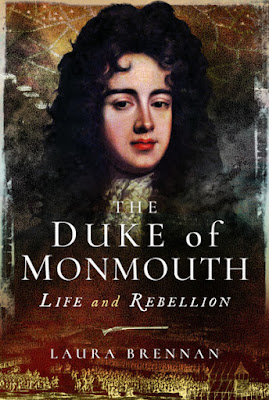Review 'Fighting For Liberty '-Stephen M Carter
Argyll & Monmouth's Military Campaigns Against The Government of King James
Have to state straight away that I am not a Monmouth supporter, but think that this book is magnificent. Even a 'York toady' like myself has to be impressed. The sheer weight of information is incredible. Mr Carter has researched the subject for many years and we can all reap the benefit. He presents many contemporary illustrations, maps, colour plates showing banners, diagrams displaying battle positions which he has created himself. Charts showing the losses on both armies, the number of defeated rebels executed, transported, and pardoned during the Bloody Assizes, town by town.
There is a most welcome chart commuting 17th century dating to modern dating. So the book will be used for as a crucial source of reference for a long time to come. 'Fighting for Liberty' is also a most readable but demanding text. Perhaps not the best work to start with if anyone is looking for a more casual introduction to the subject.
As the title points the book looks at the reconciliation between the Duke of Monmouth -who was already in exile before James II became king- and the Scottish dissenters whom he defeated at the Battle of Bothwell Bridge in 1679. Both parties realised that they could never exist in a Britain ruled by James II. James was also father in law to William of Orange the stadtholder of the Dutch Republic, and wanted the Whigs expelled from the country. So Archibald, 9th Earl of Argyll, was to launch a rebellion from Scotland, Monmouth from South West England.
The book is very concerned with the military aspects of the campaign. Consequently the Duke of Argyll's progress in the north and west of Scotland from reaching the Moray Firth on 5th May to Argyll's defeat and execution in Edinburgh on 30th June 1685, along with the battles and skirmishes, are depicted well. A similar in depth approach is used in following Monmouth and his posse landing at Lyme Regis, the initial wave of support, the march through the West Country, the defeat at Sedgemoor ,the Bloody Assizes that followed when Judge Jeffreys was unleashed, all make excellent reading. Backed by meticulous cross references, sources always cited.
Mr Carter patiently dismantles myths.For example showing that whilst there were regiments of scythemen fighting for Monmouth, there were many soldiers who were well armed, challenging the 'pitchfork' view of the rebellion . Furthermore, the notion that John Churchill was somehow aggrieved at being second to Colonel Feversham when it came to fighting the rebels, is also well challenged.
Ultimately the author's view of Monmouth seems be one of a Whig hero, fighting reaction and tyranny, firmly on the side of progress towards a more democratic society. The possibility that Monmouth was indeed the legitimate heir is alluded to - I am more neutral on the subject. Monmouth's declaration upon landing is not really analysed, but it has to be said that it did Monmouth's cause no favours -including the ridiculous claim that James started the Fire of London in 1666, and the unlikely claim that James had his brother Charles II murdered. The more opportunist side to Monmouth's nature, flirting with radicalism and the idea of a strong parliament, then deciding to have himself proclaimed king in Taunton remains unquestioned.
But my different perspective of Monmouth really counts for little when looking at all the book's positive aspects. It is a vital purchase for anyone interested in the turbulent events of 1685.
Published by Helion Books
There will be a companion Fighting for Liberty wargame appearing in Spring 2022
Steve Carter's website War Walks is also recommended.
This blog arose out of A Burnt Ship , looking at 17th century warfare & literature.
UPDATE : Currently working on Bleak Chesney Wold Charles Dickens /'dark' Victoriana blog , Monmouth Rebellion research on hold for the present. Michael Bully , March 2023


This is a great review; I have also just finished this (having read Army of James II prior).
ReplyDelete(Not directed at Steve Carter, but to Charles Singleton) I do find these Helion books (in general) a somewhat intimidating read; partly this is because (for me) the deep "academic" rigour sometimes distracts from the narrative, plus the sheer density of the material (dates, figures, miniscule detail) in the body text that could be moved to footnotes.
I also confess to finding the layout & type face a little challenging (this a Helion style guide thing) and lastly, as my mother was a copy-reader, I was bought up with meticulous attention to grammar etc.; and I find myself often irritated by some of the slack grammar, spelling & punctation in what is otherwise an excellent series of books from Helion!
I am very much looking forward to the Spring 2022 wargames companion!
Good to hear from you David. Looking back at the review, maybe should have emphasised more that this it is a military history book from a renowned publisher in the field. Planning an interview with Stephen Carter via email exchange, so perhaps we can debate the more political aspects of the 'Rebellion which aren't necessarily covered much in the book. Mr Carter is pleased with the review and shared it positively on social media.
Delete